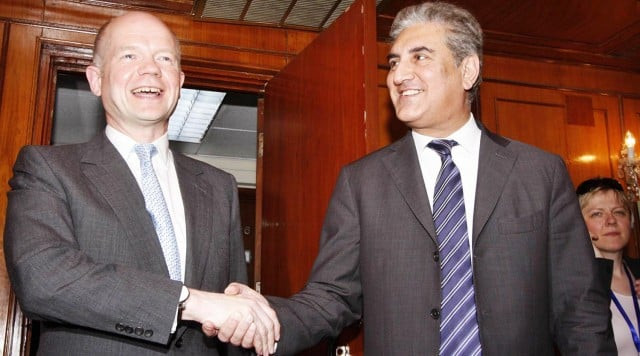In an exclusive interview on Express 24/7’s “Witness with Quatrina”, UK Foreign Secretary William Hague revealed that Britain was dedicating a majority of its aid to Pakistan’s flailing education sector. Noting that Pakistan currently faced an “education emergency” he said the country had plenty of capable people and strong assets, but lacked the capacity to educate them, and hence utilize their potential.
I wish that Secretary Hague could have stayed in Pakistan for a few more days, because then he would have seen what our “education emergency” really is. Not of just shortage of funding or capacity – its credibility.
According to former Secretary of the Election Commission of Pakistan Kunwar Dilshad, the number of parliamentarians with fake degrees stands at 148, with not a single political party receiving a clean chit. The issue came in to the spotlight with the curious case of PPP MNA Jamshed Dasti, along with several others who were forced to resign due to fake degrees. This laid the groundwork for a major investigation by the National Assembly’s Standing Committee on Education, which has asked for the educational credentials of all members of parliament, and their verification by the Higher Election Commission.
But here’s where the plot gets really twisted. Instead of feeling ashamed about lying and cheating their way to parliament through such unscrupulous practices, many of these politicians are actually hindering the Standing Committee’s investigation. According to news reports, Chairman of the Standing Committee, PML-N MNA Chaudhry Abid Sher Ali is now facing fierce opposition from his own party members, who feel that he has betrayed them by exposing their educational fallacies. This is in addition to the alleged pressure from members of the ruling Peoples Party, who also have fake degree holders in their midst.
Why is it that the law of the land is subservient to party parities? Why does loyalty trump justice? And why are social convention and personal morality seen as mutually exclusive?
The Brazilians have a term for this behavior: ‘Jeitinho’, the social practice of circumvention, where bypassing rules is the name of the game, where personal relations matter more than principles and ethics. It is quite simply the way things are in our society. Many would not even see the actions of our parliamentarians as wrong. Jamshed Dasti got elected, even after his fake degree controversy hit the headlines, because of what he called the “awam ki adalat” or the court of the people, a body that may not have any legal credibility, but certainly does have social credibility, as demonstrated in the by-elections.
It is deplorable that education is now the victim of our political “Jeitinho”. Corruption and governance have always been at the mercy of the public, but to see education suffer such a crisis of credibility is unprecedented, and a slap in the face of everyone who has had to toll through years of college and university to get to where they are. It makes them question the purpose of being educated at all, when the corrupt can just use contacts to obtain fake degrees.
The quest for knowledge has become infiltrated with the greed of a few opportunists which has sown vile seeds of doubt within its very roots. And that is the real education emergency.
When will our politicians learn?



COMMENTS
Comments are moderated and generally will be posted if they are on-topic and not abusive.
For more information, please see our Comments FAQ